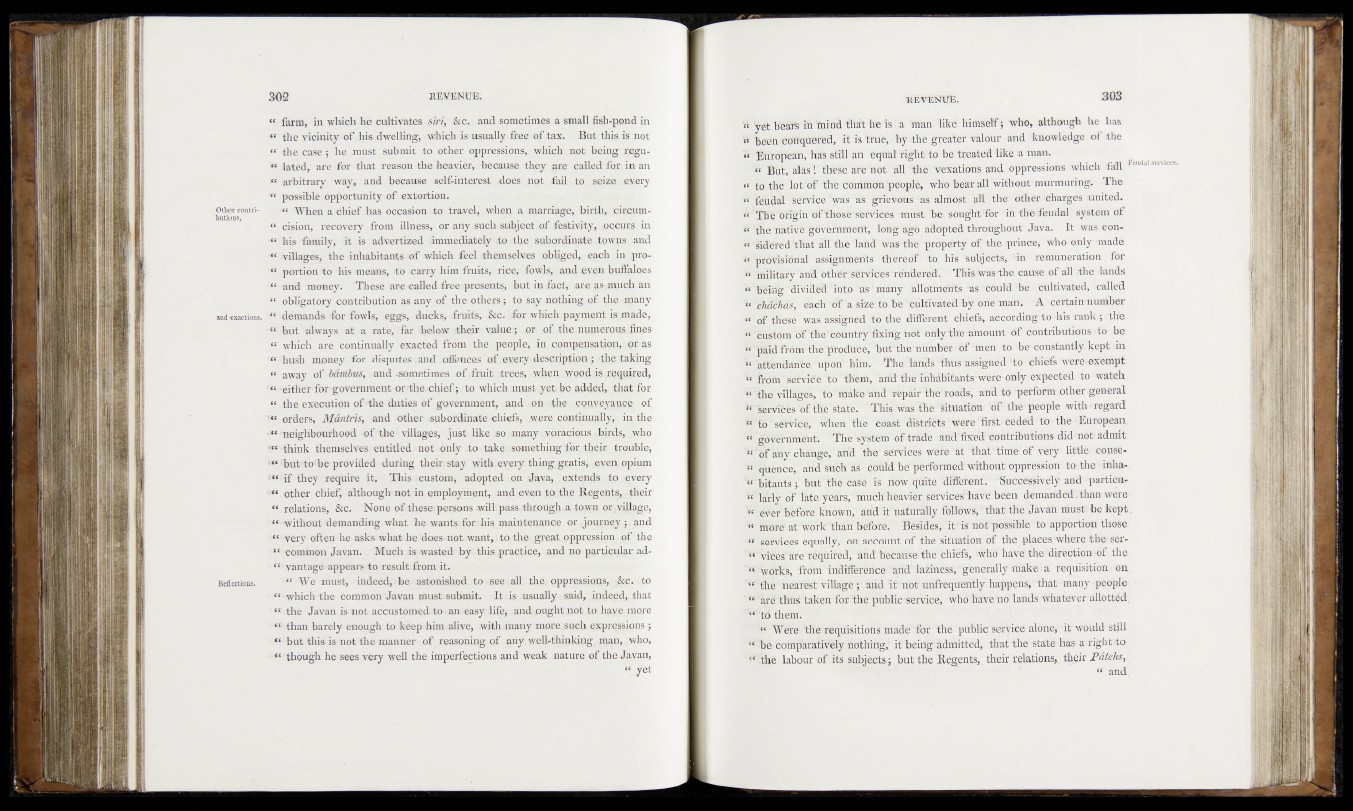
p th e r contributions,
and exactions. u
Reflections.
i form, in which he cultivates ski, -fcy and sometimes a small fiil-pmd in
:t the vicinity-of ,%#§.dwelling» which is usually BeP o fta x . But this, j l Sait
the case; he must submit to other oppressions,, -which not being.j®gu-
* fated, are for that reason the heavier» because, thgy p e calledlfor inran
« arbitrary way« and because sel£-inter.est .does npt fail fo seixe .©scry
possible opportunity o f -extortion.
« When a chief has occasion to travel, when a marriage, birth» jcifcGjum-
cision, recovery from illness, or any such aubjeetlof,festivity, ;QQeuP£^in
his family, i t is advertised immediately ho the subordinate towns and
■villages, the ‘inhabitants o f which feel #hemselves obliged, each ip pro-
“ portion to his rneajns, »to -carry Mm fruits, rice, fowls, and .even buiEftloes
* ®nd money. These are -called free presents, but ip fact, .are gs .much an
obligatory contribution as any of the others; to say »nothing »ftf the jpany
:s demands for fowls, eggs, ducks, dibits, &c. 'forjwhieh payment i&imade,
«• -but -always -at -a -rate, .far ibelow (their value; .or M (the ilUMPeruUS ..fines
“ which are continually exacted from the people, in compensation, ,or-as
| hush money .dkpiir.es, and .oflences ’.©fte.veiy; desoriptmn > fh^taking
‘ away of -bsmbus, and .sometimes o f . fijuit »trees, .when .wopdiisjp^qpjred,
‘ -either ■ for government or 4he .chief-; to which.must yQt. be added, .that |or
‘ the execution of-the duties o f government, .end .-on the ..cc^eyan^e |o f
§L orders, Mdntris, and other -auborMnate.chiefSj iSiere contiunftlly, in R e
n Haeighbourhoofl -of "the villages, just like iiojmmy VQiagiftus birds, who
« -think themselves-entitled -not only .to<•take .something for,-their trouble,
®* 'but'trftbe provided during their.stay with.evexy. thing gratis, »Qventopium
“ •if they require it. This .custom, adopted on Java, . mUqi^s i^ ie v e r y
“ other chief, although-not in employment, and even to.the Begents,j-their
“ relations, &c. None of.these, persons .wilh pass.-through.,a .toj^pi pr ,village,
“ “without -demanding what:.he; wantsforiMs maintenance or ojpijgngy ;■* mid
“ . very often-he-asks what: he «foes, not Jw.ant, f to the -great .pppr^§sipnr-i$ f liie
‘‘ common Javan. Much i s wasted' by this practice, and no particjuJkjur ad-
“ -vantage-appears to resultiiromiit»
- We -must^ indeed,!be astonished . to ?seecall. the. eppressiops, ;&c. *>to
“ -which the common’Javan must, submit. Itfis-..usually .Jaid»,i®dej||i»; that
the Javan is not accustbm^dt4ot axB.easy‘flife,..and.‘ought not to, ha,ve. more
“ than barely enough to keep him alive, with many moreesneh expressions;
“ but this is not the maimer of reasoning of any; well-thinking (man, who,
•“ though he sees very well the imperfections and weak nature of the Javan,
“ yet
«^■yet bbats ift’forttd thtft he is la tnan.!Kke Mmsdlf; who, although he has
ft bete'n db'fiquhfe'd, -it is true, byHhfe greater valour -and knowledge ®f the
“ Eftropteah, hhk still- kh 'fe'tplal right'"to1 be treated like “a mam
'« Biit, afas'l' Xi'd Jnclfc 'all t£he ’VeXatktaS and oppressions which fsfFL eu
“ to 'tlm^iot'clf xhfe ‘ddMiifofo 'people, Who beat Sill without murmuring. Thfe
« ‘fliik§P4kdi4i!<i'e’was -fs gri'ev-du's as 'alrrfbst dlft-the Other'Charges united.
h vflfe ‘6'Tigin 'd^thofeh^sfe^ViSes fotrift he'Sought for in the feudal System df
‘the natNfeJfibVVrflftietft", ldng^agb aSojitefli ‘tb'rbngbdut Jfeva.' It -was con-
^"%def edJtK-at 'ail ’i!he ’land' w’afe the prdpdrty of*the prince, Wbo^orily »made
&*pro^siShal ‘aS'sighfo'e'nts’ th^rl^8^''"^6'’: his ^subj^telM, ‘in remuneration for
(‘'ifuiifaEy'1 ^ bth^r t'S8r'Vi6% s^renH hrefl. 'This Was th e cause Of all (the lands
Being ’into Jas 'rti’ariy' alldttrtCfifs ^s ‘feould %e ‘'cultivated,'called
®7'ikacJias', 1&ch Hff^a §fk’el'<b bte^'ctiltifiteB' by-li6^e man. A ‘ceitainmurrlbCr
“'"o^tfiese was assigned, to'lhV'difeeif# chiefs*‘according^eshk Paute;Jtlfe
h'dt'tjhly’the airiouiit'of ’dbntributi'Oh^ito be
^‘*p’aid frbm‘<fhe‘prodbceJ%Ut^e^nBMber^f®men to'’be-e’onstarltiy.'kept (in
^‘^^enda'nie’ Juf>s8n' him. The ^bS^M^ned were^exmnpt
1«4ro'ih‘ s e ^ ^ e ^ u !’'th^m, inMBi£a1ats’FWere ohly^c|»dctM:^d -watch
i<{^lhe'fiifiges, ith‘ttik'eva>nd'riepfcr^'eAc5aBs, anti to perform other general
^%e-m6’es-lb f tlih"state.' r This’lVas' Ihe'^Sit'iiktinTi! ,t?f/ the'pedple with »regard
^ ‘tf^seHice,’ w h e n ^ S i S t t i i t s ^ W e V e ’hrSt»ceddd -to - the ‘‘European
^JffivernlBtnl^ The 'tr^de arfd ‘fixed’’contrifeiftiohs didin0t/admit
^‘ of^^^ciiange,1 ‘ ar& ife^M m ^ s" JW^kelS'4t ThatlBri^e’of'-very’ lltWe-obnse-
"‘‘k^enle^frJd'kUch’asJ. cBhfdhBeup'eTf6rked''vkthoht,‘tppThssio'n- t-o*%be ■ ihlia-
**“ pft'ants ; b^t^he^ic^e- Is AMr ‘q[t#ite ed!?ffeirent. ^Buct^^ively1 and -'partioa-
v« T ^ y of Tate years, * rdifchheav^^ ^^vife^sRhkV^ been.' demanded!, than were-
^ ^ y f T ^ J e l^nown/'atid it natdrafly ffeflA^s/* t'hat'-the'TavSn' mukt‘ be kept.
%’ at'*wbrkytMtf B§fdSe5 Be',?Meb,!i it*^|tiA8t^p6issi®e''to apporbon-those-
^ i^^w ce s equally, on1 accouhtli,df tn^^^^m'i^^imeipiaees'sW'here ihe-ser-
°’‘‘*vit?is'lkre ‘rbc^iiiffed, a n d t h e 1 feh?§fs,^ ^i-Bo'havei^^p rdH-ebti6n*of-.the.
^*Wqrks, ft dm*‘in differed c^-hrid" laziness,'t?tgfenerally' ma'ke i a requisition- On
nearest village arid ‘if^'nbt? uAftequhtftly^ HS^pensjHhat many-people
1 “ *Areuthb^ taken fox *the' ptfhlic'Sbr^ce',' -^hohaVefht?'iahds'-wbatever-dlfott4d;
“ l^o thdhi:1'
Were ‘the'ffeqdisirion^foffl-e^of ^We pWBlieteVicb alohe/'ik wohld-stJU;
“ be Comparatively nothing,' it' beid^WdAiitt^'dj that ‘the '•Statd-has- a?rigfet^to
1 “‘ithe labour of its subjects; but the Begents,,. their" reletions^. their Pdtehs, %
« and.